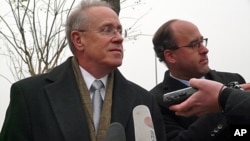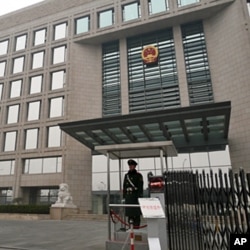The United States has again urged China to free Xue Feng, an American citizen arrested on charges of stealing state secrets. U.S. diplomats were not allowed into the court to hear the proceedings in Xue's appeal.
A guard at the Beijing High People's Court Tuesday refused entry to the U.S. Deputy Chief of Mission Robert Goldberg, who had hoped to attend the appeal hearing for American geologist Xue Feng.
"We made a formal request to attend Dr. Xue's appeal hearing, and provide him consular support consistent with the 1980 US-China Consular Convention," Goldberg said. "The Beijing High People's Court denied this request, and they denied it without explanation."Xue was born in China, but is a naturalized American citizen. In July, he was convicted of obtaining state secrets by procuring a database on China's oil industry, and was sentenced to eight years in jail. The sentence came more than two years after Xue disappeared into Chinese custody while on a business trip.
Speaking to reporters outside of the courthouse Tuesday, Goldberg called on the Chinese government to ensure fairness and transparency in Xue's appeal.
"We urge the Chinese to grant Dr. Xue humanitarian release and immediate deportation so that he can return home to the United States, and reunite with his family," he added.
Goldberg says the embassy has filed a formal protest with China's Ministry of Foreign Affairs, and is waiting for a response.
Foreign Ministry spokesman Hong Lei was asked about Xue Feng's case at a regular briefing Tuesday.
Hong says Chinese judicial authorities will handle the case according to law. At the same time, he says, China will, in his words, "continue to fulfill its obligations according to the consular agreement with the United States."
There has been no word about a verdict in Xue's appeal.
Xue's case and other recent similar cases highlight China's vague state secrets law and its effect on business. In China, business and economic data that is public knowledge in most countries often is classified as a state secret - sometimes retroactively.
Several recent cases involving business and economic secrets also indicate that Chinese who take foreign citizenship, but return to China to work, may be more vulnerable to Chinese laws.
Last year, China-born Australian citizen Stern Hu was detained for stealing state secrets relating to information about iron ore prices. Hu was later sentenced to 10 years in jail on lesser charges of receiving kickbacks and stealing commercial secrets.
Hu's employer at the time, Australian mining giant Rio Tinto, is still in China doing business.
Xue Feng's former employer, U.S. energy consulting company IHS Inc, also maintains operations in China.





